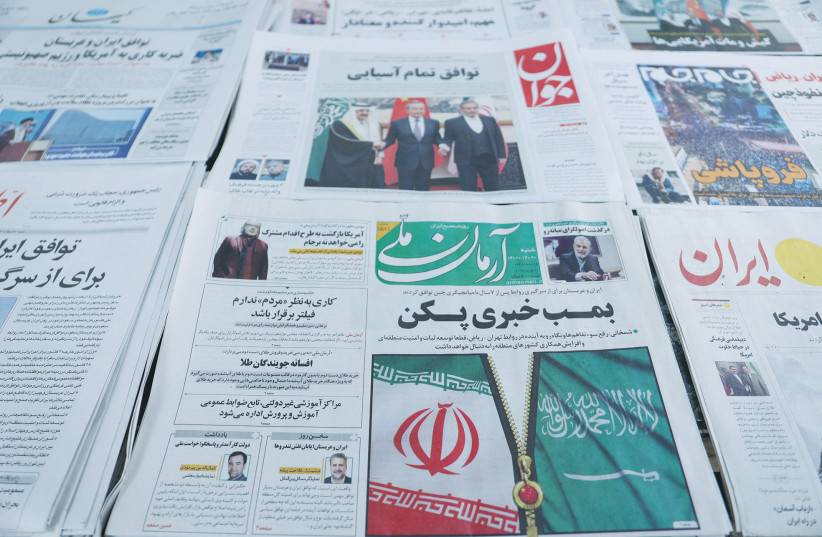On March 10, China’s top diplomat, Wang Yi, flanked by senior security officials from Iran and Saudi Arabia, announced that the two countries had agreed to restore diplomatic relations. The image of the three side by side was reminiscent of similar images from Washington over many years: presidents Jimmy Carter, Bill Clinton and Donald Trump flanked by the Arab and Israeli leaders of the time, celebrating peace, the Oslo Accords and the Abraham Accords.
The Chinese organizers, masters of ceremony, were sending a clear message: what America could do, China can also do. For decades, China has produced peace plans, held peace forums and sent peace envoys to the Middle East. The difference was that America’s actions changed Israel, the Middle East and the world, while China’s changed nothing. Is something new happening?
The March event triggered a shock wave across the world. Most commentators agreed that there were three big winners, China, Iran and Saudi Arabia, one big loser, Israel, and maybe one small loser, the United States.
China demonstrated that it is a major player in the Middle East and possibly beyond, and that it can achieve goals that are out of reach for America.
The lost alliance between Israel and the Gulf states

Iran spectacularly wrecked American sanctions as the Saudi finance minister announced that his country would soon start investing in Iran. A defensive alliance between Israel and the Gulf states now seems very remote.
Saudi Arabia demonstrated, also spectacularly, that it could look after itself, had options in addition to the US and could treat America with the same indifference with which it had been treated by some previous American administrations.
Israel briefly woke up from its domestic turmoil, acknowledged its strategic defeat, blamed America’s Joe Biden and the opposition party’s Yair Lapid and then returned to its turmoil.
The Americans did not quite know whether they are winners or losers, which illustrates Biden’s unclear and contradictory Middle East policies. Five full days after the Beijing event, Secretary of State Antony Blinken emerged to welcome any reduction of tensions. Just a short time before, a US Defense Department official had announced new sanctions against Iran. Winner? Loser?
Long-term geopolitical implications of the Beijing accord
Commentators did not notice two long-term geopolitical implications of the Beijing accord. First, it is not a stand-alone event but part of something much larger. China is slowly revealing a new, comprehensive plan for the Middle East. In January 2022, an article in the Communist Party’s Global Times advised the Arabs that they would be better off with China as their main partner instead of America. Then in December 2022, President Xi Jinping visited Saudi Arabia and met with the leaders of the Arab world.
A LONG statement issued after the recent summit demanded a Palestinian state in line with the Arab position. This was nothing new. Iran’s president, Ebrahim Raisi, made a state visit to Beijing in February 2023. A joint statement demanded that Israel open its nuclear activities to the control of the IAEA. This was new. No Chinese president had ever signed a statement critical of Israel, certainly not one co-signed by Iran.
And then came the Beijing-mediated accord between Iran and Saudi Arabia. What are the next stages of China’s master plan? Trying to impose the 1967 borders on Israel? Coercing Israel to disclose its nuclear secrets?
And here is the second long-term geopolitical implication of the Beijing accord and the preceding events: China seems to be turning more actively against Israel. There are other signs, for example, China’s increased anti-Israeli activism in the UN. Asking why China is becoming more adversarial is the wrong question.
The right question is: Why did China wait so long? Since 1951, a year after Israel recognized the People’s Republic of China, the United States has involved itself in the China-Israel relationship. For 20 of the last 72 years (1979-1999), Israel had a green light for arms exports to China.

Red lights from Washington
But for more than 50 years, Israel has gotten red lights from Washington, first against diplomatic, then defense and finally, many investment and technological agreements with China. Israel learned that the indispensable political and military support it gets from America comes with strings attached, including the reduction of China links.
As the conflict between the superpowers heats up, America would like more support from Israel in the struggle, which means that China will likely regard Israel increasingly as an American pawn. Israel suffers growing collateral damage from a conflict it did not create and cannot influence. America has reasons to prohibit certain Israeli technology exports but it should not cause China and Israel to become enemies.
China’s Middle East policies could seriously harm Israel’s interests. Whether America wants to leave the Middle East, as many suspect, or whether it wants to stay, this would not be in America’s own national interest.
The writer is a senior fellow at the Jewish People Policy Institute (JPPI). He is the author of China and the Jewish People – Old Civilizations in a New Era and Rise and Decline of Civilizations – Lessons for the Jewish People.
